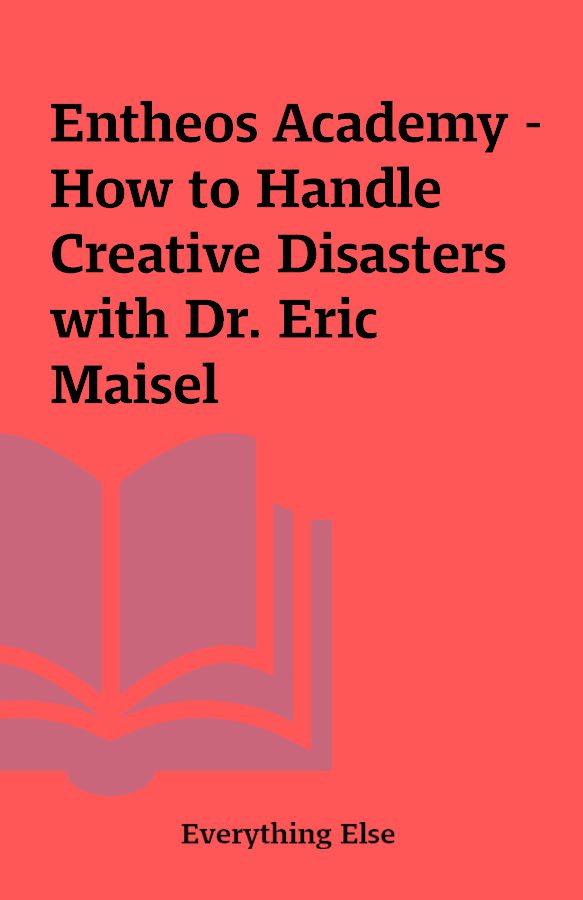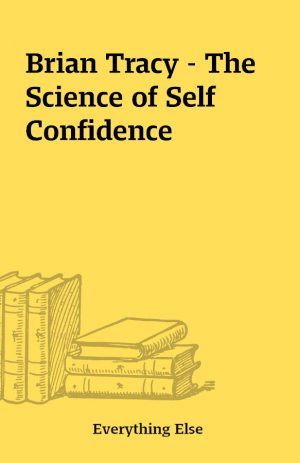Entheos Academy – How to Handle Creative Disasters with Dr. Eric Maisel
HowToHandleCreativeDisasters.mp4
[WebRip – 1 MP4]
Description
Class OverviewThe creative process comes with its share of mistakes, messes, failures, and other “disasters.” How you handle them determines whether you will give up or persevere. Here are ten tips that will help! (Check out the Top 10 Big Ideas from the class below!) Your ProfessorDr. Eric Maisel is the author of 40+ books and is one of the world’s leading creativity coaches. His interests include the creative life, creativity coaching, and natural psychology, the new psychology of meaning.How to Handle Creative DisastersThe creative process comes with its share of mistakes, messes, failures, and other “disasters.” How you handle them determines whether you will give up or persevere. Here are ten tips that will help! The Top 10 Big Ideas1Mind Your Language! Is it really necessary to call it a “disaster”? How does it serve you to use such a harsh word on something you created with genuine love and real sweat? How do words like disaster, failure, mess or mistake help you? You are in charge of the language you use and employing the most self-disparaging language available can’t be a good idea! 2Instantly Forgive Yourself All right, something unfortunate happened. You can pile a ton of guilt and an extra thousand pounds of regret on your back because of this unfortunate occurrence or you can forgive yourself right now, without a moment’s hesitation, before the weight of your guilt and regret drop you to your knees. Self-forgiveness is not the same as not owning your part in what you’ve wrought—rather, it is simple kindness and the only way to guarantee second chances.3Engage in Self-Support Do you deserve the good chocolate or the deep massage only as a reward for some success? Isn’t it just as sensible to treat yourself in soothing, self-supportive ways when something is making you feel miserable, something that has the potential of lingering on as a permanent source of unhappiness? If you haven’t learned how to genuinely support yourself, this is an excellent opportunity to figure out how!4Take a Break and Reappraise Maybe it wasn’t a disaster at all!—or maybe it was only a limited disaster. Take the weekend off and then look at your painting again. Bravely return to the scene of the disaster and see if it really was a disaster. Very often it wasn’t!5Reframe it as a Learning Experience It is genuinely the case that we learn best from our “mistakes and messes” if—and only if—we can find the courage to look our creative project in the eye and see what worked and what didn’t work. If you make this brave effort, then this creative project, no matter how poorly it turned out, becomes a real learning experience and maybe one of your most profound ones. It is not a mere mental tactic or a play-on-words to reframe disasters as learning experiences—they are exactly that, if you treat them that way.6Salvage the Good Parts A given creative project may “fail” in its totality but still contain many “good bits” that can be salvaged. For instance the imagery you chose for your painting may still appeal to you if only you had executed it differently or better. Look at your creative project with fresh eyes, maybe after a weekend away from it, and focus on what can be saved rather than on what must be discarded.7Get Back to Work A “disaster” is a perfect excuse to stop creating altogether. You get it in your mind to lick your wounds, you take a break from the hard work of creating, and you find that days, weeks, months and even years are slipping away through avoidance. Even after the worst “disaster” get back to work! Maybe you need a weekend away; maybe you need a week. But don’t let it be too long. We can lose vast stretches of time if we allow our “failed” creative projects to become excuses for not getting back on the horse and trying again.8Exorcise Lingering Regrets It is one of the unfortunate habits of our mind to return unbidden to our “disasters,” including those that happened years or even decades ago. For some evolutionary reason we are built to dwell on our failures and not on our successes. You will want to counteract this natural but unfortunate habit by mindfully “letting go” of regrets the moment they arise. When you hear yourself beating yourself up about that ruined painting from twenty years ago, say to yourself, “Nope! Don’t need that thought.” Exorcise it instantly.9Get Feedback In certain circumstances it may pay to have a second set of eyes take a look at the supposed “disaster” and give you feedback on what he or she sees. This may be especially true when you yourself aren’t sure if the painting in front of you is or isn’t a disaster and if there is someone in your life whose opinion and judgment you respect. Use feedback wisely, circumspectly and only occasionally—but if this is right moment for feedback, seek it out.10Honor the Process Once you deeply understand the realities of the creative process you will know in your bones that “disasters” are to be expected. Only a naïve romantic thinks that everything he tries will turn out beautifully. In fact, the more ambitious your efforts the greater the likelihood that you will stretch yourself to your limits and sometimes exceed your grasp. Honor the creative process by embracing the idea that “disasters” come with the territory. We do not love them but they shouldn’t surprise us and they mustn’t derail us.
You must be logged in to post a review.






Reviews
There are no reviews yet.